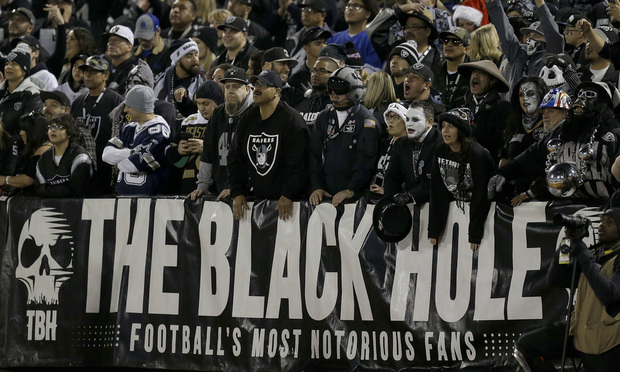Oakland Throws a Block at DOJ Bid to Weigh in on Antitrust Claims Over Raiders Move
Lawyers with DOJ's Antitrust Division contend that lost tax revenues don't constitute an injury to “business or property” recoverable under federal antitrust law and to find otherwise "could lead to anticompetitive effects from over-deterrence."
July 16, 2019 at 05:55 PM
4 minute read
 Fans watch from The Black Hole end zone at Oakland Alameda County Coliseum during the first half of an NFL football game between the Oakland Raiders and the Dallas Cowboys in Oakland on Dec. 17, 2017. AP Photo: Ben Margot
Fans watch from The Black Hole end zone at Oakland Alameda County Coliseum during the first half of an NFL football game between the Oakland Raiders and the Dallas Cowboys in Oakland on Dec. 17, 2017. AP Photo: Ben Margot
Lawyers for the City of Oakland are crying foul that antitrust lawyers at the Department of Justice are attempting to back the National Football League in the city's lawsuit over the Raiders' upcoming relocation to Las Vegas.
The city sued the Raiders, the NFL and its remaining 31 teams late last year claiming that they conspired to “boycott” Oakland in violation of federal antitrust laws and in breach of the league's own relocation policies in signing off on the team's move to Las Vegas. In particular, the city claims the $378 million “relocation fee” that the team paid to the league's other team owners acted as “supra-competitive cartel payments.”
Lawyers from the DOJ's Antitrust Division on July 12 filed a “statement of interest” in the case on behalf of the United States taking something of a rooting position for the teams over the city. The DOJ lawyers contend that lost tax revenues—which the city alleges are at stake—don't constitute an injury to “business or property” recoverable under the Clayton Act.
“ Such expansive recovery would be contrary to the language of the statute and to precedent, and could lead to anticompetitive effects from over-deterrence,” wrote the Antitrust Division lawyers. The DOJ lawyers also contend that tax losses alone are not a proper basis for standing under the antitrust laws since those losses are “derivative of the harm to market participants who miss out on welfare-enhancing transactions.”
The government lawyers are asking U.S. Chief Magistrate Judge Joseph Spero, who is overseeing the case, to dismiss the city's claims brought under Section 4 of the Clayton Act ”to the extent they are based on lost tax revenues.” They are not, however, taking a position regarding the city's other allegations or theories in the case.
The city's lawyers at Berg & Androphy and Pearson, Simon & Warshaw and in the City Attorney's office Monday fired back with an objection claiming that the federal government had no interest at stake in the lawsuit and that the Antitrust Division filing came too late in the game. The city's filing noted that the DOJ asked to weigh in just a week before the NFL's motion to dismiss the case is set to be argued before Spero—nearly three months after briefing on that motion closed. (The Raiders are represented by counsel from Arnold & Porter Kaye Scholer in the case and Covington & Burling represents the league and its remaining teams.)
“The DOJ's position would allow professional sports teams, like the Oakland Raiders, to reap the taxpayer-financed benefits derived from the prospects of tax revenues, but then claim immunity from liability when their unlawful conduct injures the host cities that provided those benefits,” the city's lawyers wrote. “A blanket rule that a host city could not recover lost tax revenues would provide professional sports teams with a huge anti-competitive advantage, and an incentive to violate the antitrust laws that much more.”
DOJ representatives didn't immediately respond to a request for comment.
Pearson Simon's Michael Pearson wasn't immediately available for comment Tuesday afternoon.
Read more:
Raiders Receiver Shares, Then Deletes, Twitter Apology After Settling Lawsuit Over Tossed Furniture
Oakland Sues the Raiders, NFL, and 31 Other Clubs Over Team's Vegas Getaway
NFL Franchise Moves and Controversies Create a Lucrative Playing Field for Big Law
This content has been archived. It is available through our partners, LexisNexis® and Bloomberg Law.
To view this content, please continue to their sites.
Not a Lexis Subscriber?
Subscribe Now
Not a Bloomberg Law Subscriber?
Subscribe Now
NOT FOR REPRINT
© 2025 ALM Global, LLC, All Rights Reserved. Request academic re-use from www.copyright.com. All other uses, submit a request to [email protected]. For more information visit Asset & Logo Licensing.
You Might Like
View All
Justin Baldoni Sues Blake Lively and Ryan Reynolds for $400M in New Step in 'It Ends With Us' Fight
6 minute read
Patreon Hit With Lawsuit for Allegedly Diverting Subscriber Data to Meta

Music App Denied Injunction Against Apple Over Alleged Scheme to Block Its Access to App Store

$15K Family Vacation Turned 'Colossal Nightmare': Lawsuit Filed Against Vail Ski Resorts
Trending Stories
- 1'Astronomical' Interest Rates: $1B Settlement to Resolve Allegations of 'Predatory' Lending Cancels $534M in Small-Business Debts
- 2Senator Plans to Reintroduce Bill to Split 9th Circuit
- 3Law Firms Converge to Defend HIPAA Regulation
- 4Judge Denies Retrial Bid by Ex-U.S. Sen. Menendez Over Evidentiary Error
- 5Lawyers: Meet Your New Partner
Who Got The Work
J. Brugh Lower of Gibbons has entered an appearance for industrial equipment supplier Devco Corporation in a pending trademark infringement lawsuit. The suit, accusing the defendant of selling knock-off Graco products, was filed Dec. 18 in New Jersey District Court by Rivkin Radler on behalf of Graco Inc. and Graco Minnesota. The case, assigned to U.S. District Judge Zahid N. Quraishi, is 3:24-cv-11294, Graco Inc. et al v. Devco Corporation.
Who Got The Work
Rebecca Maller-Stein and Kent A. Yalowitz of Arnold & Porter Kaye Scholer have entered their appearances for Hanaco Venture Capital and its executives, Lior Prosor and David Frankel, in a pending securities lawsuit. The action, filed on Dec. 24 in New York Southern District Court by Zell, Aron & Co. on behalf of Goldeneye Advisors, accuses the defendants of negligently and fraudulently managing the plaintiff's $1 million investment. The case, assigned to U.S. District Judge Vernon S. Broderick, is 1:24-cv-09918, Goldeneye Advisors, LLC v. Hanaco Venture Capital, Ltd. et al.
Who Got The Work
Attorneys from A&O Shearman has stepped in as defense counsel for Toronto-Dominion Bank and other defendants in a pending securities class action. The suit, filed Dec. 11 in New York Southern District Court by Bleichmar Fonti & Auld, accuses the defendants of concealing the bank's 'pervasive' deficiencies in regards to its compliance with the Bank Secrecy Act and the quality of its anti-money laundering controls. The case, assigned to U.S. District Judge Arun Subramanian, is 1:24-cv-09445, Gonzalez v. The Toronto-Dominion Bank et al.
Who Got The Work
Crown Castle International, a Pennsylvania company providing shared communications infrastructure, has turned to Luke D. Wolf of Gordon Rees Scully Mansukhani to fend off a pending breach-of-contract lawsuit. The court action, filed Nov. 25 in Michigan Eastern District Court by Hooper Hathaway PC on behalf of The Town Residences LLC, accuses Crown Castle of failing to transfer approximately $30,000 in utility payments from T-Mobile in breach of a roof-top lease and assignment agreement. The case, assigned to U.S. District Judge Susan K. Declercq, is 2:24-cv-13131, The Town Residences LLC v. T-Mobile US, Inc. et al.
Who Got The Work
Wilfred P. Coronato and Daniel M. Schwartz of McCarter & English have stepped in as defense counsel to Electrolux Home Products Inc. in a pending product liability lawsuit. The court action, filed Nov. 26 in New York Eastern District Court by Poulos Lopiccolo PC and Nagel Rice LLP on behalf of David Stern, alleges that the defendant's refrigerators’ drawers and shelving repeatedly break and fall apart within months after purchase. The case, assigned to U.S. District Judge Joan M. Azrack, is 2:24-cv-08204, Stern v. Electrolux Home Products, Inc.
Featured Firms
Law Offices of Gary Martin Hays & Associates, P.C.
(470) 294-1674
Law Offices of Mark E. Salomone
(857) 444-6468
Smith & Hassler
(713) 739-1250






